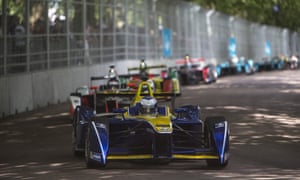New rules paving the way for a Monaco-style street based grand prix come into force on Monday, which will allow motor sports on closed public roads.
The changes will clear the way for motor sports promoters to apply for permission to stage races on public highways in England, from small-scale local events to international races such as a city-based grand prix.
Andrew Jones, the transport minister, said the move would cement Britain’s position as a world leader in motor sports and highlighted the overwhelming support the measure received in a consultation.
“We had a consultation on this idea last year and there were 6,000 responses and it was overwhelmingly positive … Of the councils who responded, they again were overwhelmingly positive,” he said. “This could be a real boost for the economies of an area.”
The suggestion that London might hold a grand prix has been mooted on and off since 2011, with Bernie Ecclestone, who was then the Formula One boss, known to back the idea and having offered to cover the cost of staging the event.
However, the prospect of a London grand prix has been ruled out for the foreseeable future
after a spokesperson for Sadiq Khan, the mayor, said city hall would only support an event if F1 teams achieved a significant reduction in the air pollution from their vehicles.
“London is always open to hosting the world’s biggest and best sport events – from athletics to NFL and baseball,” Khan’s spokesman said. “However, we would want to see a significant reduction in air pollution from F1 cars before city hall could support a grand prix on the streets of the capital.
“This new legislation also means that it is now possible for Formula E races involving environmentally friendly, electric-powered cars to be held on public roads. The mayor’s office is in discussion with Formula E to see if it may be feasible for London to host such a race.”
Despite that, the Department for Transport (DfT) said the new rules could lead to “small races hosted by local communities, bigger European rallies or even a future Monaco-style grand prix in an English city”.
Jones said: “The examples would be in cycling. We had the Tour de France here. We had a grand depart in Yorkshire a couple of years ago and roads were closed as part of that event and hundreds of thousands of people came to watch it.
“It had a huge impact, not just for boosting cycling in the UK but for boosting tourism wherever it went. I would hope we would see something comparable for motor sport.”

Under the new rules, the Motor Sports Association (MSA), which governs motor sports in the UK, and Auto Cycle Union (ACU), which regulates motorcycle racing, will be authorised to issue race permits after satisfying councils, police and other local bodies that the events would be safe.
Local authorities will have the final say over whether a race can go ahead, and may require additional safety measures before, during or after the event as a condition of allowing a race to take place, the DfT said.
Rob Jones, chief executive of the MSA, welcomed the change, which his organisation had campaigned for. “We can now take motor sport to the people, and in turn those local hosting communities have the opportunity to benefit from the economic boost that these events may provide,” he said.
The changes come despite some consultation responses raising concerns that allowing racing on highways could act as a precedent for a “speed culture” among drivers. Transport for London, which oversees the capital’s highways, warned that an event route could attract “unofficial ‘races’ where riders or drivers utilise the road at speed”, potentially leading to an increase in road deaths.
Further dampening prospects for a London grand prix, Westminster council, which is responsible for many of the capital’s most recognisable landmarks, said during the consultation that it would not consider hosting an on-road event, citing concerns for the impact on businesses and buildings of important historical significance.
Jones denied the changes could send the wrong message at a time when fierce debate raged over levels of air pollution across the UK. “Actually, motor sport development has been at the heart of developing more efficient engines, and that benefits everybody,” he said.
“So technological developments, either in vehicle efficiency or in road safety, have come through [motor sport innovations] into the main fleets that you or I may drive. The two are not incompatible, the two are in fact directly related.”



